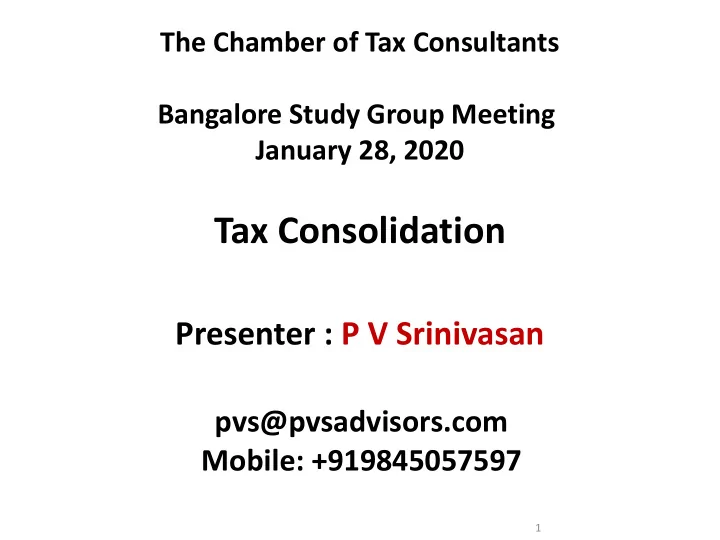

The Chamber of Tax Consultants Bangalore Study Group Meeting January 28, 2020 Tax Consolidation Presenter : P V Srinivasan pvs@pvsadvisors.com Mobile: +919845057597 1
• Tax Consolidation - Concept Supreme Court in Govind Saran Ganga Saran v CST (1985) 155 ITR 1. 144. Components of Tax : 2. Character of levy a) Person on whom the levy should be imposed. b) Value / Tax Base on which the levy should be imposed. c) Rate at which the levy should be imposed. d) Tax Consolidation : 3. Based on principles of economic unity - a corporate group a) under “common control”. Serves horizontal equity b) “Person” / Taxable Unit : The corporate group. c) Expands the “ tax base” ? “Tax Base” : Aggregate the results of all d) members of the group. 2
• Tax Consolidation - Concept Ownership: 5. 100% - aligns with horizontal equity. a) 75% to 95% - commonly employed b) 50% - rare but still in vogue. c) Aspect of Minority interest d) Components of Ownership: Value, Voting Power, Significant 6. influence etc. Methods : 7. Pooling a) Absorption b) Attribution c) Contribution d) 3
• Tax Consolidation - Concept Group : Geographical inclusion 1. Country Group a) • PE of a non-resident subsidiary • Resident Subsidiary held by the PE Trade bloc Group b) Worldwide Group c) 4
• Tax Consolidation - Concept Tax Consolidation – Elective / Mandatory 8. Consolidation Cycle : 9. Forming the Group – All eligible members / Selection? a) New Member Joining – Mandatory / Optional? b) Member Exiting – Voluntary / By law c) De-consolidation: Group Termination d) 10. Consolidation Term: Irrevocable a) Revocable after a specified term b) Revocable any time c) 5
• Tax Consolidation - Concept Losses 11. Pre Consolidation losses – Cancel, Transfer, Quarantine a) Losses during Consolidation Term b) Group losses on De-consolidation – Retain / distribute? c) Intra-group asset transfer : 12. Gain / Loss is taxable a) Gain / Loss is deferred – recapture events? b) Intra-group share transfer: 13. Gain / Loss is taxable a) Gain / Loss is deferred – recapture events b) 6
• Tax Consolidation - Concept Computation mechanism: 14. Same tax period? a) Same accounting method? b) % taxable income of a member to be included? c) Separate returns by each member – aggregation by group-head? d) Only a combined return by group head? e) Tax liability: 15. Joint and Several a) Respective share of tax b) Penalties / Fines c) Tax neutral payments for tax value d) Succession of group – Acquisition / Merger etc. 16. 7
• Tax Consolidation – Benefits and Limitations Benefits: Loss offset against profits within the group. 1. Elimination of tax on intra- group asset transfer . 2. Better cash management as inter-company dividends between group members 3. are eliminated from taxable income. Higher deductions and credits subject to conditions of percentages/size etc. 4. Serves as an effective anti-abuse in the home country of Group head. 5. Lesser number of SAAR a) Lower scope for GAAR – Tax consolidation is based on Substance over Form. b) Enhances global competitiveness for corporate groups headquartered in a 6. country. Ease of Doing Business: 7. Ease of tax administration, superior in an e-assessment, enhances a) collection ease and revenue predictability. Risk rating of the Corporate group. b) Ability to handle scale. c) Ease of compliance – single assessee, single appeal etc. d) Some disallowances would become redundant - Sec 14A, 40A(2)(b) e) 8
• Tax Consolidation – Benefits and Limitations Limitations: Expertise : Needs higher skill sets, specialisation – both for businesses and tax 1. administration. Irrevocable Status : A separate regime, will bind future years as Group. May 2. not be able to roll back such decision in future. Forego fragmentation benefits : Huge losses of group entities may curtail the 3. deduction and credits. Alignment of tax period : If joining is permitted during a tax year, it may curtail 4. the tax period for the joining member. Limitations based on lapsing of tax-year may get adversely impacted - e.g. losses, tax credits etc. Alignment with tax treaty: 5. “Enterprise” used in treaty - separate company? a) Foreign tax credit provisions, how to look at doubly taxed income? b) 9
• Tax Consolidation - Concept Alignment of anti-avoidance provisions: 1. Transfer Pricing a) Controlled Foreign Corporation b) Place of Effective Management c) Interest deduction limitation d) Countries having tax consolidation regime: 2. –) USA – domestic pooling, absorption for foreign companies –) France, Spain, New Zealand, Japan, Russia – Pooling –) UK – Group Relief –) Germany – Loss contribution –) Australia - Absorption –) Netherlands – based on fiscal unity –) Denmark , Italy – Joint Taxation 10
Recommend
More recommend